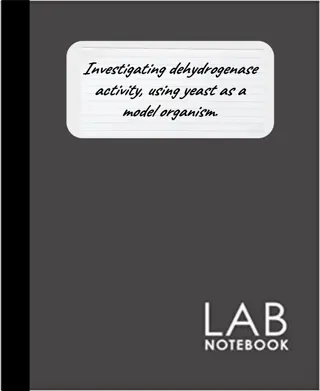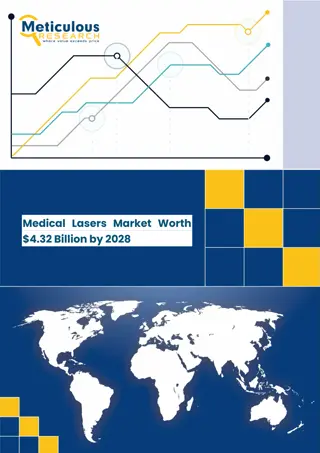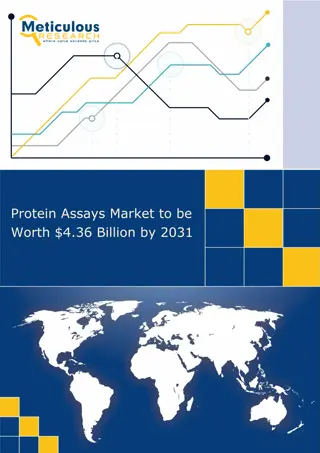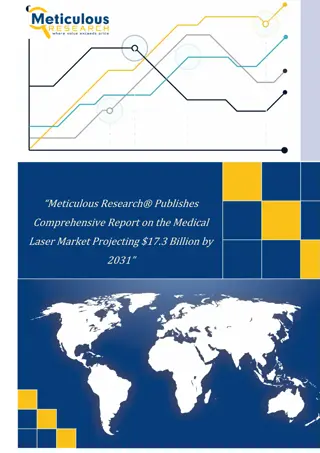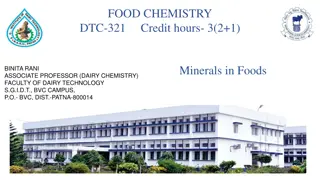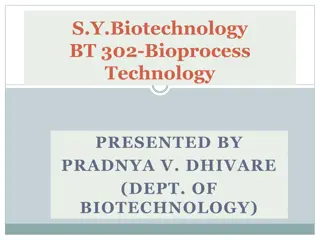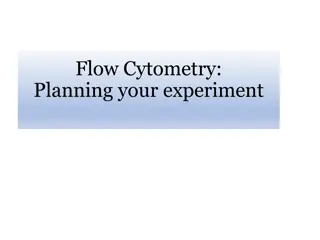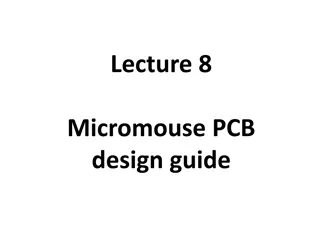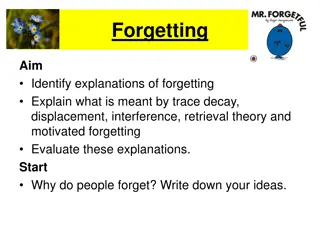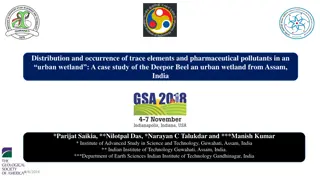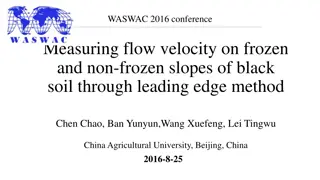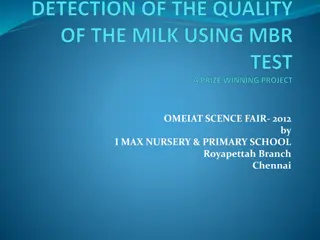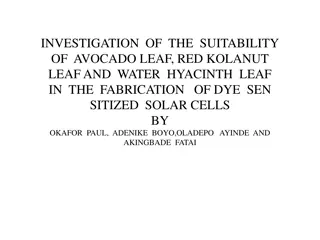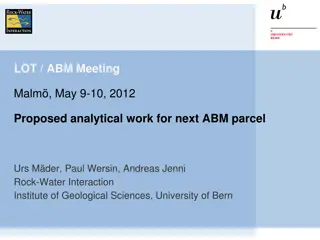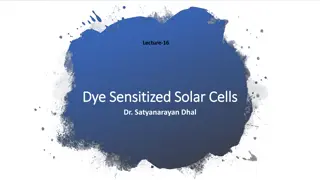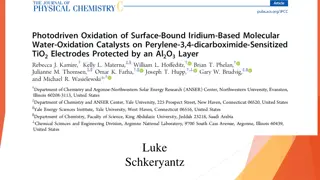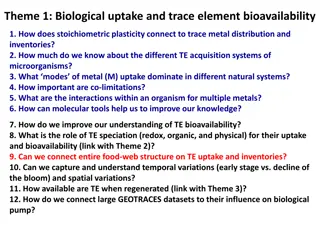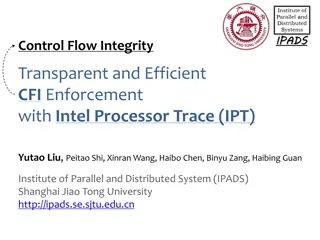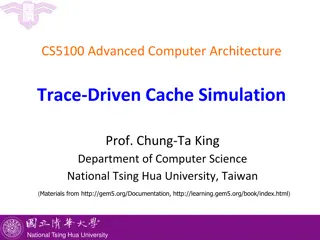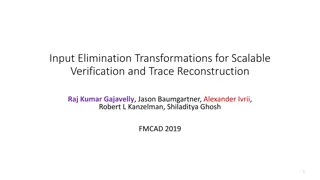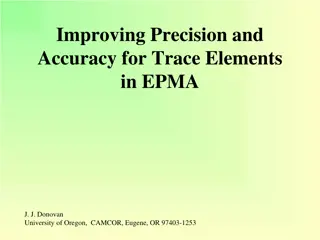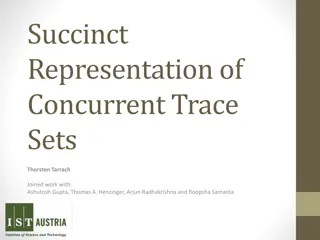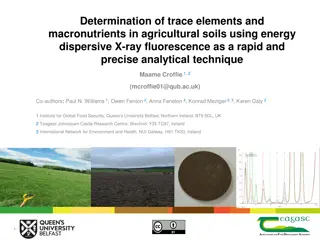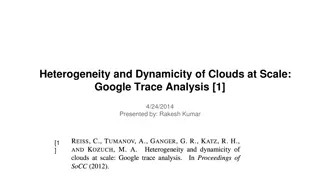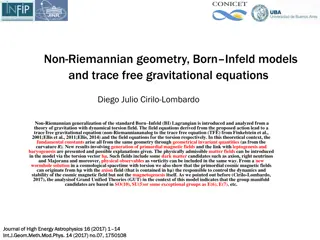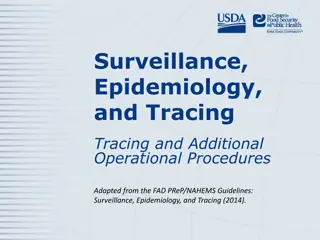Medical Lasers Market Worth $4.32 Billion by 2028
Medical Laser Market by Device Type (Solid-state Lasers, Gas Lasers, Dye Lasers); Fiber Type, Application, Fiber Application, and Geography\u2014Global Forecast to 2028
0 views • 4 slides
Investigating Dehydrogenase Activity Using Yeast
This investigation focuses on exploring respiration in yeast by tracking the breakdown of glucose using dehydrogenase enzymes. The experiment involves immobilizing yeast into gel balls and measuring the change in color of resazurin dye to quantify the rate of respiration. Safety measures, risk asses
2 views • 11 slides
Understanding Cell Viability Assays in Laboratory Testing
Cell viability assays play a crucial role in determining the health and status of cells, measuring their ability to survive and proliferate. These assays involve various techniques such as dye exclusion, colorimetric, fluorometric, luminometric, and flow cytometric assays. By assessing factors like
6 views • 16 slides
Medical Lasers Market Worth $4.32 Billion by 2028
Medical Laser Market by Device Type (Solid-state Lasers, Gas Lasers, Dye Lasers); Fiber Type, Application, Fiber Application, and Geography\u2014Global Forecast to 2028
1 views • 4 slides
Optimization of Order Size for a Small Manufacturing Firm
A small manufacturing firm purchasing 3400 pounds of chemical dye per year seeks to minimize total costs by optimizing order sizes. With initial conditions and pricing details provided, calculations for order sizes at different price points are considered to determine the most cost-effective solutio
2 views • 11 slides
Protein Assays Market
Protein Assays Market by Type (Dye-based, Copper-based) Technology (Fluorescence, Absorbance, Colorimetric) Offering (Reagent, Kit, Instrument) Application (R&D, Drug Discovery, Diagnostics) End User (Pharmaceutical, Hospital) \u2013 Global Forecast to 2031\n
2 views • 4 slides
Meticulous Research® Publishes Comprehensive Report on the Medical Laser Market Projecting $17.3 Billion by 2031
Medical Laser Market Size, Share, Forecast, & Trends Analysis by Type (Device Type (Solid-state Lasers, Gas Lasers, Dye Lasers, Diode Lasers), Fiber Type (Disposable Laser Fibers, Reusable Laser Fibers)), Application (Device, Fiber), and Geography -
1 views • 4 slides
The Unhealthy Truth About Food Coloring - Risks and Effects Revealed
Food coloring may not only impact the taste of food but also pose significant health risks, including potential links to cancer, ADHD, kidney tumors, and more. Certain colors like blue, indigo, and red are particularly dangerous. Despite its ability to add color, excessive use of food dye can result
0 views • 7 slides
Understanding the Importance of Minerals in Foods
Minerals play vital roles in food chemistry and human nutrition. There are main elements, trace elements, and ultra-trace elements present in foods that contribute to various physiological functions. Sodium, potassium, magnesium, and calcium are essential minerals with specific roles impacting human
6 views • 27 slides
Understanding Bioprocess Technology and its Applications
Bioprocess technology involves utilizing living cells or their components like bacteria and enzymes to produce desired products through fermentation. This field covers a range of processes, including microbial bioprocesses, enzyme production, metabolite synthesis, recombinant products, and transform
0 views • 15 slides
Planning Your Flow Cytometry Experiment: Building a Staining Panel
For successful flow cytometry experiments, it is crucial to plan your staining panel carefully by selecting appropriate markers and antibodies. Determine the goal of your experiment, research historical data for similar experiments, and choose markers specific to your cell type. Utilize resources fo
0 views • 19 slides
Principles of Staining in Histopathologic Techniques
Beginning with an introduction to staining in biochemical techniques, this chapter delves into the types of stains, factors influencing selectivity, and commonly used stains in histopathology. Learning objectives include defining staining, discussing dye-tissue affinity, understanding selectivity fa
2 views • 107 slides
Micromouse PCB Design Guide
This guide provides step-by-step instructions for designing a PCB for a micromouse. It covers components placement, sensor positioning, trace thickness, and trace style to optimize the performance of the micromouse. Proper positioning of components and sensors is crucial, along with considerations f
0 views • 22 slides
Exploring Explanations of Forgetting in Memory
This content delves into various explanations of forgetting in memory, such as trace decay, displacement, interference, retrieval theory, and motivated forgetting. It discusses why people forget and evaluates these theories. Additionally, it explores the Multi Store Model of Memory and concepts like
0 views • 74 slides
Distribution and Occurrence of Trace Elements in Urban Wetland: A Case Study of Deepor Beel, Assam, India
This study focuses on the distribution and occurrence of trace elements and pharmaceutical pollutants in the urban wetland of Deepor Beel in Assam, India. The research investigates the presence of emerging contaminants like pharmaceuticals and personal care products, providing insights into the poll
0 views • 10 slides
Measurement of Flow Velocity on Frozen and Non-Frozen Slopes of Black Soil Using Leading Edge Method
This study presented a detailed methodology for measuring flow velocity on frozen and non-frozen slopes of black soil, focusing on the Leading Edge method. The significance of shallow water flow velocity in soil erosion processes was emphasized. Various methods for measuring flow velocity were compa
0 views • 23 slides
Methylene Blue Reduction Test for Milk Quality Assessment
The Methylene Blue Reduction (MBR) test is utilized to assess the quality of milk based on the reduction of color imparted by a dye. The disappearance of color indicates the presence of bacteria in milk. This test involves adding methylene blue dye to milk samples, observing the color change, and me
0 views • 20 slides
Investigation of Avocado, Red Kolanut, and Water Hyacinth Leaves for Dye Sensitized Solar Cells
This study explores the potential of using natural plant dyes from avocado leaf, red kolanut leaf, and water hyacinth leaf in fabricating dye sensitized solar cells (DSSCs). The introduction discusses the need for alternative energy sources due to global warming, with DSSCs offering a low-cost and e
0 views • 34 slides
Basic Principles of Medical Geology and Trace Elements Overview
This session delves into the fundamental principles of medical geology and its impact on human health. It explores how exposure to certain elements in the geologic environment can affect well-being, emphasizing pathways of trace elements into the body and their consequences. Dr. Patrick Asamoah Saky
0 views • 26 slides
Overview of Minerals and Trace Elements in Human Nutrition
Minerals and trace elements play essential roles in the human body, categorized into groups based on their functions and requirements. Nutritional minerals like calcium, phosphorus, and magnesium are needed in larger amounts, while trace elements such as zinc and iron are required in smaller quantit
0 views • 50 slides
Analytical Work for Rock-Water Interaction at LOT/ABM Meeting
Proposed analytical work for the next ABM parcel focuses on trace minerals, soluble salts, and dissolved organic acids in the context of rock-water interactions. The investigation includes qualitative measurements, new separation techniques, and analysis of iron-bentonite interactions. The aim is to
0 views • 9 slides
Understanding Dye-Sensitized Solar Cells and Types of Dyes in Solar Cell Technology
Explore the world of dye-sensitized solar cells and the various types of dyes used in these innovative solar energy technologies. Discover the difference between metal-complexes and organic dyes, learn about the advantages and disadvantages of different dyes, and delve into the absorption spectra of
0 views • 16 slides
Introduction to Dye Sensitized Solar Cells
Dye Sensitized Solar Cells, pioneered in 1991, offer cost-effective and efficient solar energy conversion. Comprising a photoanode with a dye sensitizer, electrolyte, and counter electrode, these cells operate by converting sunlight into usable electrical energy. The cells can be enhanced for higher
0 views • 21 slides
Advancements in Dye-Sensitized Photoelectrochemical Cells
History traces the development of photoelectrochemical cells since 1972, highlighting the progress, challenges, and state-of-the-art dyes used, with an emphasis on improving performance through innovative solutions like Al2O3 layers. Key issues such as dye degradation and electron-hole recombination
0 views • 15 slides
Importance of Outdoor Ethics and Leave No Trace Principles
Outdoor ethics play a crucial role in preserving natural areas for future generations. The increase in visitors to wilderness areas highlights the need for responsible behavior. Integrating Leave No Trace principles into programs like BSA emphasizes the value of conservation and respect for the outd
0 views • 14 slides
Understanding Biological Uptake of Trace Elements in Natural Systems
Explore the connection between stoichiometric plasticity and trace metal distribution, investigate microbial acquisition systems, analyze modes of metal uptake, and address co-limitations and interactions within organisms. Utilize molecular tools to enhance knowledge on trace element bioavailability
0 views • 5 slides
Transparent and Efficient CFI Enforcement with Intel Processor Trace
This research discusses Control Flow Integrity (CFI) enforcement to combat control flow hijacking attacks. It explores methods for runtime CFI enforcement, including instrumented checking and transparent monitoring. The study delves into trace mechanisms, buffer management strategies, and when to tr
0 views • 32 slides
Trace-Driven Cache Simulation in Advanced Computer Architecture
Trace-driven simulation is a key method for assessing memory hierarchy performance, particularly focusing on hits and misses. Dinero IV is a cache simulator used for memory reference traces without timing simulation capabilities. The tool aids in evaluating cache hit and miss results but does not ha
0 views • 13 slides
Input Elimination Transformations for Scalable Verification and Trace Reconstruction
This work introduces new input elimination techniques for scalable model checking in industrial applications, focusing on trace reconstruction. The transformations aim to make the netlist more tractable for solving, involving various algorithms such as retiming, phase abstraction, and bitwidth reduc
0 views • 27 slides
Enhancing Precision and Accuracy in Trace Element Analysis Using EPMA Techniques
This research focuses on improving precision and accuracy for trace elements through advanced methods like MAN (mean atomic number) and MPB (multi-point background). By optimizing background measurements and calibration techniques, researchers aim to enhance the sensitivity and reliability of trace
0 views • 16 slides
Succinct Representation of Concurrent Trace Sets in Program Synthesis
This work focuses on representing concurrent trace sets efficiently in program synthesis. It addresses the problem setting of concurrent programs with specifications and provides solutions for avoiding assertion violations, including adding locks, barriers, and wait-notifies. The synthesis loop ensu
0 views • 25 slides
Rapid Analysis of Soil Macronutrients Using Energy Dispersive X-ray Fluorescence
Determination of trace elements and macronutrients in agricultural soils is crucial for crop productivity. This study highlights the advantages, challenges, and objectives of using energy dispersive X-ray fluorescence for rapid and precise analysis. The method requires minimal sample preparation, co
0 views • 10 slides
Guidelines for Implementing Customer Logging in Businesses for Coronavirus Safety in England
Specific guidance for businesses in England on implementing customer logging to prevent the spread of coronavirus, including the importance of recording staff, customers, and visitors, and collaborating with Test and Trace for effective outbreak containment and prevention. The document includes info
0 views • 15 slides
Understanding Cloud Heterogeneity and Dynamicity: A Google Trace Analysis
Exploring the heterogeneity and dynamic nature of clouds at scale using Google Trace Analysis, focusing on machine allocation, workload types, job durations, task shapes, and machine churn. The study offers insights into resource allocation in evolving multi-tenant clusters and highlights the challe
0 views • 16 slides
Bringing Leave No Trace to Scouting: Expectations and Training Sessions
Encouraging Leave No Trace practices in Scouting is essential. This guide covers expectations for instructors, training sessions, BSA trainings, promotion strategies, and leadership positions related to Leave No Trace. From promoting the message to in-depth training opportunities, the focus is on in
0 views • 12 slides
Understanding Trace Tables for Algorithm Testing
Trace tables are a valuable technique used to test algorithms step by step and identify logic errors. They involve using truth tables to track variable values or conditions. This content provides insights into trace tables, correcting errors in pseudocode, using examples for variable tracking, and c
0 views • 9 slides
Redox Conditions and pH Control in a Mountain Watershed: Study in Red Canyon, Wyoming, USA
Exploring redox conditions and trace element concentrations in a semi-arid mountain watershed, this study in Red Canyon, Wyoming, delves into the impact of oxic surface water and anoxic groundwater on trace element cycling. The investigation aims to enhance understanding of seasonal variabilities, f
0 views • 11 slides
Non-Riemannian Geometry and Born-Infeld Models in Gravitational Theory
In this paper by Diego Julio Cirilo-Lombardo, a non-Riemannian generalization of the Born-Infeld Lagrangian is introduced in the context of gravitation with a dynamical torsion field. The resulting field equations lead to a trace-free gravitational equation and provide insights into primordial magne
0 views • 34 slides
Fijian Masi - Brown Dye Task with Mangrove Bark
Explore the traditional Fijian art of masi, involving brown dye made from mangrove bark to create intricate patterns. Solve the task of determining how many sections can be decorated with existing dye tubs. Visual representations included.
0 views • 6 slides
Tracing in Animal Disease Control: Guidelines and Procedures
This presentation delves into the importance of tracing in animal disease control, covering trace-back and trace-forward methods, sources of information, collaboration services, and the role of livestock owners. It highlights the guidelines and operational procedures adapted from FAD PReP/NAHEMS, fo
0 views • 27 slides

